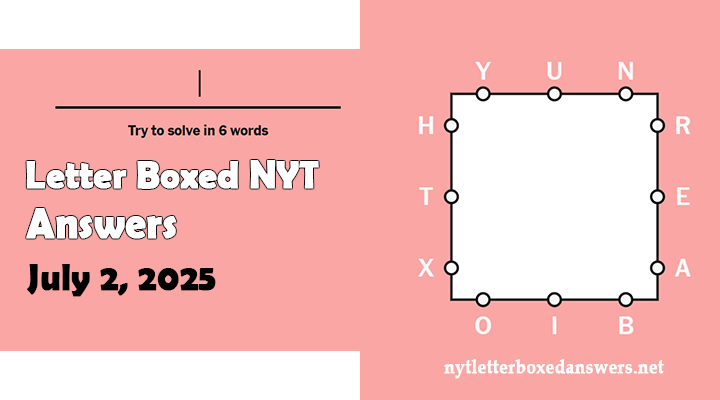NYT Letter Boxed quiz for Wednesday July 2, 2025 is released. We came up with Letter Boxed July 2 2025 Answers and Hints for you. With the help of these hints, you will be able to guess the words of letter boxed quiz without revealing the answers and get the solution.
| Top | Right | Bottom | Left |
|---|---|---|---|
| YUN | REA | OIB | HTX |
| Two Words Solution | ||
|---|---|---|
| BAHUT | TYROTOXINE | |
| BHOTIYA | ANTINEUROTOXIN | |
| BHOTIYA | AUTONEUROTOXIN | |
| BHOTIYA | AXONEURON | |
| Three Words Solution | ||
|---|---|---|
| ABEYANT | TOXIN | NEHRU |
| ABHOR | RUBAIYAT | TEXAN |

Word 01:
This 5-letter word starts with B and ends with T; an old chest or coffer, used for storage.
Often ornate, used in medieval homes.
Could store linens, valuables, or armor.
Name comes from French; historically elegant.
Sometimes used as a bench or seat.
Decorative furniture piece in antique shops.
Found in castles or period dramas.
Related to the word “buffet” in etymology.
Known for heavy wood and intricate carvings.
Could appear in museum furniture collections.
Word 02:
This 10-letter word starts with T and ends with E; a toxin derived from decomposing cheese.
Greek root: tyros (cheese) + toxikon (poison).
Rare word found in early toxicology texts.
Allegedly formed during spoilage of dairy.
Studied in 19th-century biochemistry.
Often questioned in modern science.
Related to theories on foodborne illness.
Possibly linked to early germ theory.
Associated with “cheese poisoning.”
Archaic term; not widely accepted today.
Word 01:
This 7-letter word starts with B and ends with A; ethnic group from the Himalayas of northern India.
Inhabitants of Uttarakhand and neighboring regions.
Known for trading across high mountain passes.
Traditionally practice Tibetan Buddhism.
Speak a Tibeto-Burman language.
Name often associated with pastoralism.
Culturally tied to yak and sheep herding.
Integral to the Bhotia ethnic identity.
Their language is listed as endangered.
Key to cross-border Indo-Tibetan history.
Word 02:
This 15-letter word starts with A and ends with N; a substance that counters the effects of neurotoxins.
Used in treating snake bites or botulism.
Opposite of neurotoxin in effect.
A specialized type of antitoxin.
Found in medical and emergency kits.
Part of immunological or biochemical therapies.
May be derived from antibodies.
Often studied in toxicology and neurology.
Targets toxins affecting nerve tissue.
Administered in life-threatening poisoning cases.
Word 01:
This 7-letter word starts with B and ends with A; ethnic group from the Himalayas of northern India.
Inhabitants of Uttarakhand and neighboring regions.
Known for trading across high mountain passes.
Traditionally practice Tibetan Buddhism.
Speak a Tibeto-Burman language.
Name often associated with pastoralism.
Culturally tied to yak and sheep herding.
Integral to the Bhotia ethnic identity.
Their language is listed as endangered.
Key to cross-border Indo-Tibetan history.
Word 02:
This 14-letter word starts with A and ends with N; possibly a coined term for a self-generated neurotoxin.
Could describe internal toxin affecting nerves.
Relevant in autoimmune or degenerative diseases.
May be theoretical in neuromedicine.
Combines “auto-” (self), “neuro-” (nerve), and “toxin.”
Could relate to body attacking its nervous system.
Possible usage in neurology or psychiatry.
Not a widely standardized medical term.
Might appear in speculative or experimental writing.
Suggests toxicity arising from within.
Word 01:
This 7-letter word starts with B and ends with A; ethnic group from the Himalayas of northern India.
Inhabitants of Uttarakhand and neighboring regions.
Known for trading across high mountain passes.
Traditionally practice Tibetan Buddhism.
Speak a Tibeto-Burman language.
Name often associated with pastoralism.
Culturally tied to yak and sheep herding.
Integral to the Bhotia ethnic identity.
Their language is listed as endangered.
Key to cross-border Indo-Tibetan history.
Word 02:
This 9-letter word starts with A and ends with N; likely a coined term referring to axons and neurons.
Combines “axon” and “neuron” in one concept.
May describe a unit of nerve signaling.
Possible in neuroscience contexts.
Could relate to axonal transmission.
Relevant to nerve cell anatomy.
Not common in general usage.
Would be logical in scientific writing.
May appear in tech or neuroprosthetic fields.
Indicates nerve impulse mechanics.
Word 01:
This 7-letter word starts with A and ends with T; describes something temporarily inactive or suspended.
Used in law, status, or political contexts.
Synonym: dormant, pending, paused.
“In abeyance” = held in suspension.
May describe authority or legal rights.
From Old French abeance = expectation.
Often used in government or inheritance cases.
Suggests temporary interruption, not cancellation.
Can describe an idea or project waiting.
Formal word for deferred status.
Word 02:
This 5-letter word starts with T and ends with N; a poisonous substance produced by living organisms.
Can come from bacteria, plants, or animals.
Causes illness, paralysis, or death.
Example: botulinum or tetanus toxin.
Targeted by antitoxins in medicine.
Major subject of toxicology.
Also refers to venom and biotoxins.
Affects biological systems at the cellular level.
Present in diseases and infections.
May be natural or synthetic in action.
Word 03:
This 5-letter word starts with N and ends with U; surname of India’s first Prime Minister.
Jawaharlal, key figure in Indian independence.
Known for nonalignment during Cold War.
Associated with socialist-leaning economics.
Promoted secularism and democracy.
His name is attached to schools, coats, and stadiums.
Father of Indira Gandhi.
Often seen wearing a band-collared jacket.
A legacy figure in Indian politics.
Central to mid-20th-century Indian history.
Word 01:
This 5-letter word starts with A and ends with R; means to hate or detest strongly.
Stronger than dislike; evokes disgust.
From Latin abhorrere = to shudder away from.
Often used in moral or emotional contexts.
Can refer to ideas, actions, or people.
Literary word for intense repulsion.
Synonyms: loathe, hate, despise.
Seen in ethical or dramatic writing.
Associated with righteous rejection.
Not a casual word—implies passion.
Word 02:
This 8-letter word starts with R and ends with T; collection of Persian quatrains, famously translated by Edward FitzGerald.
Associated with poet Omar Khayyam.
Often themed around life, wine, and mortality.
Classical Persian poetic form.
Each stanza has four lines.
Rhyming scheme often AABA.
Celebrated in Victorian literature.
Rich in imagery, fatalism, and beauty.
Revered in both East and West.
Title means “quatrains” in Persian.
Word 03:
This 5-letter word starts with T and ends with N; someone from the state of Texas.
Related to southern U.S. identity.
May refer to cowboys, oil, or BBQ culture.
Common in westerns and country music.
Recognizable by accent and pride.
Associated with cities like Dallas and Austin.
State with independent republic history.
Known for large scale and boldness.
Appears in sports team names and brands.
One of the 50 U.S. states; this word defines a resident.

Chris Brown is a passionate word game love and problem solving expert. With over 15 years of experience in solving puzzle challenges, he provides daily NYT Letter Boxed answers, tips and strategies to help other players so that they can improve their solving skills. Whether you are stuck on a tricky puzzle or looking for new techniques, Chris is here to guide you with his expert solutions.